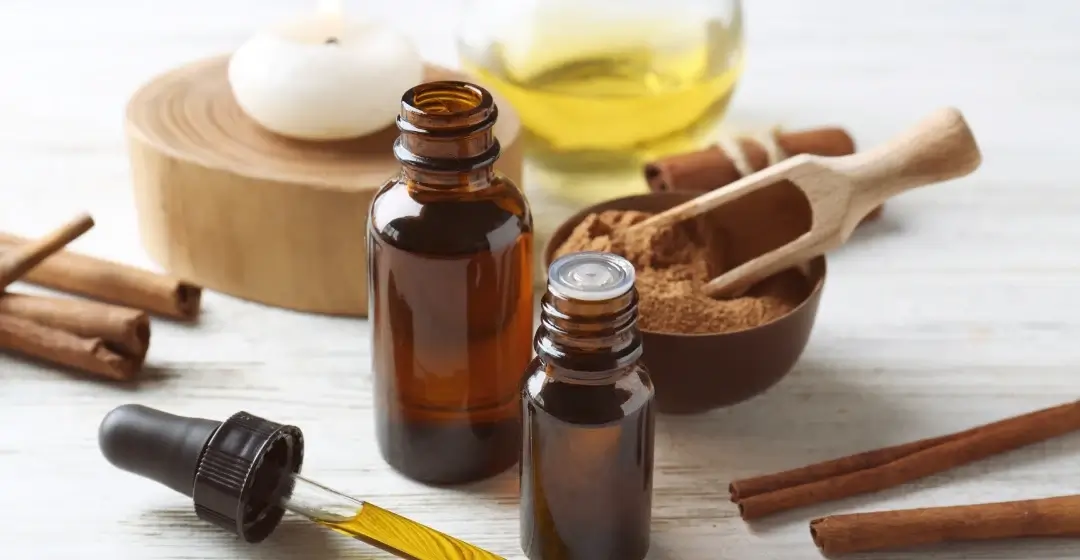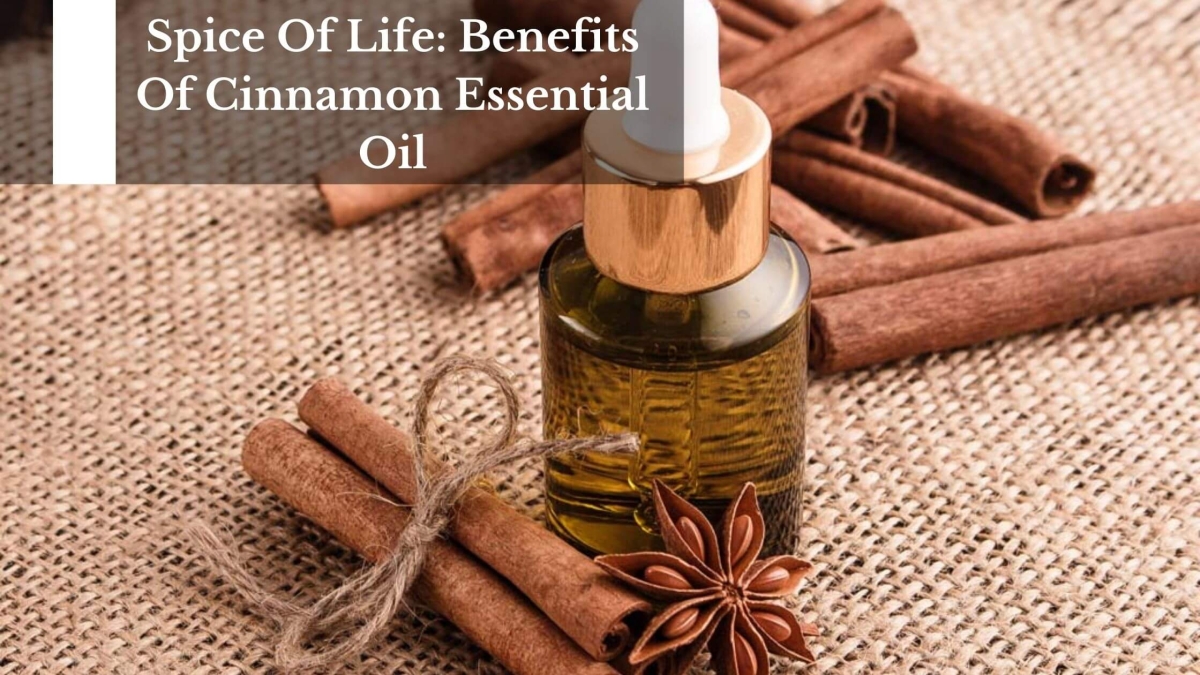Cinnamon is a spice obtained from the inner bark of several trees of the genus Cinnamomum. It has been used for centuries as a flavoring agent, mainly for desserts, but also in medicine and traditional Chinese remedies. The bark is first soaked in water and then ground to create a brownish-yellow powder with a strong aroma. Cinnamon Oil can be extracted from both cinnamon sticks or leaves by steam distillation. Ingesting cinnamon oil is not recommended because it contains much higher levels of coumarin than are found in other parts of the plant, especially if it’s not correctly distilled beforehand.
You may also like:
Cinnamon oil has strong antioxidant properties and can help reduce the destructive effects of free radicals in the body. This not only offers support to your immune system, but can also help delay or even reduce the effects of aging as it fights against damaging toxins such as bacteria, viruses, and impurities in the blood. There are two types of substances known as eugenol and cinnamaldehyde in cinnamon essential oil that have anti-inflammatory properties.
Health Benefits Of Cinnamon Essential Oil:
1) Antioxidant Properties
Cinnamon oil helps the body by eliminating free radicals. These are oxygen molecules that are produced when your body experiences stress or is bombarded by toxins. The free radicals can damage your cells and cause diseases. Cinnamon oil helps to remove these from the body and thus helps to keep you healthy and strong.
2) Anti-bacterial Action
The essential oils present in cinnamon oil have antibacterial properties that can help reduce the number of harmful bacteria in your blood, which can help prevent infection. These antibacterial properties also reduce inflammation caused by infection, fever, arthritis, skin conditions, wounds & ulcers.
3) Helps To Maintain A Healthy Metabolism
This essential oil helps to maintain healthy sugar levels in the body, which is vital for metabolic control. Your body uses it for energy and every cell needs it to function properly. When your body doesn’t have the right amount of energy, you experience fatigue. If you don’t feel energized, you can be sure that cinnamon oil can be of help.
4) Promotes Gums & Teeth
Cinnamon oil has antiseptic properties that help reduce inflammation in the mouth and prevent tooth decay. It also helps to keep gums healthy and strong by reducing plaque buildup and preventing bacteria from sticking to them.
5) Anti-Diabetic Effect
Cinnamon oil helps to maintain a balanced level of blood sugar. This is important for diabetics, and also for those who are at risk of developing the disease because they have a family history of diabetes. It can also be beneficial for anyone who wants to reduce their risk of diabetes.
6) Helps To Prevent Heart Disease
Several studies link cinnamon essential oil’s antioxidant and anti-inflammatory properties to reduced risk of coronary heart disease. The essential oils present in cinnamon oil can help reduce pain, especially when used topically on cuts and burns. It reduces inflammation in the body and helps to keep your heart healthy.
7) Provides Energy Boost
Cinnamon oil contains more than just antioxidants. It also promotes the production of endorphins which makes us feel happy and energetic when we are feeling low. This is why cinnamon oil is often used to remedy depression, anxiety, and stress.
8) Improves Digestion
The essential oils present in cinnamon oil help with the digestive process in several ways. They work as a natural treatment for digestive issues such as indigestion, flatulence, constipation, and diarrhea. They can also be used to alleviate any symptoms caused by food poisoning or infections that may have affected your digestive system.
9) Improves Cognitive Function
The essential oils present in cinnamon oil help to improve the quality of your life. There have been many studies that have shown that these essential oils can help maintain brain health, memory, and concentration. They can also help prevent dementia caused by oxidative damage. They are great for reducing stress and keeping your mind clear.
10) Balances Hormones
Cinnamon oil is believed by many to promote hormonal balance in women. This helps with menstrual pain, and PMS symptoms such as cramps, mood swings, and bloating. It is also beneficial for men who have low testosterone levels or reduced fertility capabilities.
11) Contains Anti-Inflammatory Properties
Cinnamon oil contains substances that help reduce inflammation, mainly found in the relief of inflammatory painkillers. It also has antispasmodic and stomach-soothing properties on its own. These are often used to treat digestive issues such as irritable bowel syndrome and ulcers.
12) Great For Skin Care
Cinnamon oil can be used as an all-natural solution for any type of dry skin condition such as eczema, psoriasis, stretch marks, and even diaper rash! It is usually mixed with carrier oil or lotion before application into the affected area to improve absorption and aid in better moisturization.
How To Use Cinnamon Essential Oil For Healthcare?

Step 1: Before applying cinnamon essential oil, it is always best to do a small skin test to make sure you don’t have an allergy. Apply a drop of the cinnamon oil onto a patch of skin and leave for 24 hours. If there are no adverse reactions, you can then proceed to use the oil topically.
Step 2: With all essential oils, it is recommended that you dilute them in a carrier oil before application. For example, if you use cinnamon essential oil on your hands then mix 10-20 drops with 1 ounce of sweet almond oil or jojoba oil. This is necessary because pure essential oils can be too strong and even cause irritation when applied directly to the skin.
You may also like:
Step 3: You can use cinnamon essential oil in a variety of ways. It is versatile and can be used for many purposes, including but not limited to diluted oil diffused, massages, baths, lotions, cough drops, and mouthwashes. The oils are also very easy to find and inexpensive when obtained online or from health stores.
FAQs:
1) How do I use cinnamon oil?
It is best to dilute the cinnamon oil so it’s easier to absorb. Mix 4-10 drops of essential oil with a carrier oil, such as almond or jojoba oil. It is also recommended that you dilute the oils with a carrier before applying them to the skin.
2) What is cinnamon oil used for?
Cinnamon essential oil can be used in many ways, including but not limited to: diluted oils diffused, massages, baths, lotions, cough drops, and mouthwashes. Cinnamon oil is believed to be safe and has been used for centuries as a culinary spice in many cultures. It is generally recognized as safe when low amounts are used. It may produce irritation when applied directly to the skin and, therefore, it is recommended that you dilute it before applying it to the skin. Cinnamon oil should not be used on infants who have sensitive skin or might be allergic to essential oils. Supplemental use of cinnamon oil is considered safe if taken under the supervision of a healthcare practitioner.









